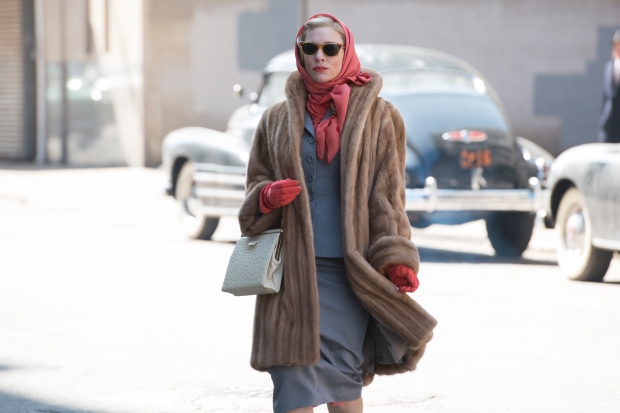Carol is an easy film to admire — so beautiful to look at; entirely exquisite — but such a hard film to feel anything for. Based on Patricia Highsmith’s 1952 lesbian novel The Price of Salt, this is a love story that, here, doesn’t venture below the waist, literally, emotionally or metaphorically. It glides across its own glittering surfaces, never investigating what may lie beneath, and playing restraint to the point of inertia. Its director, Todd Haynes, has spoken about how hard it was to make a Hollywood film about two women, starring two women, so I feel bad delivering the news, but deliver it I must: what was taboo in ’52 may not be that exciting today.
Set in 1950s New York, and with costumes (by Sandy Powell) and mis-en-scène to die for, come back to life, and die for all over again — the furs!; the hats!; the shiny, gunmetal Packards! — this follows the ‘forbidden romance’ between Carol (Cate Blanchett) and Therese (Rooney Mara). Carol is the older. Carol is wealthy, in the midst of a divorce, and has a little daughter, Rindy. (Rindy? Rooney? Each to their own, I suppose.) Therese is in her twenties and works in a Manhattan department store. They meet in the run-up to Christmas, when Carol arrives at the store to buy Rindy a particular doll but, having sold out of that doll, Therese advises a train set, and their eyes lock. Carol purchases the train set and I did want to know what Rindy thought of it, having been expecting a doll, but we never find out. Perhaps they are saving that for Carol 2: The Slog Continues.
Therese and Carol start meeting: in restaurants, at Carol’s place, in Therese’s modest apartment. Their increasing attraction to each other is told in looks, glances, further eye-locking, a hand left on a shoulder for a beat too long. It’s meticulous, but on and on it goes, without any changes in the coolly detached, humourless tone, so it feels like the same scene played over and over, with no tension, story development, or narrative propulsion. It’s all so enervating. I wanted to take a stick and beat it while imploring: ‘Get on with it!’ and ‘Come to life, God damn you!’ This is not so much the love that dare not speak its name, as the love that looked at the energy that might take, and promptly decided against it.
The second hour is an improvement, I’ll admit, as an escalation in the ugliness of Carol’s marriage means the two Actually Have To Do Something beyond glance at each other, meaningfully, for what feels like hours, and possibly days. So they embark on a road trip, in that gunmetal Packard, travelling along the west coast, staying in motels. But this is a film, which, unlike Brooklyn, say, cares more for its visual style than its characters. For example, even though Carol is now living out of a small suitcase, and you’d expect her to show some signs of dishevelment, she still always looks as if she’s spent the morning running between her furrier and Vidal Sassoon. Their love is consummated, but so tastefully, and with such an absence of any below-the-waist action, and such an absence of pent-up desire, it’s a total non-event. They might as well have been unblocking the sink. It’s as sexy as that.
The novel is different. The novel is told from Therese’s point of view, thereby offering us her interior life: her fears, her desires, her loneliness, her awakening sexuality. But this makes Carol the centre of attention, and robs Therese of any psychological heft or depth whatsoever. She is passive, insipid, and forever gazing out of windows, passively and insipidly. I think even my goldfish Bubbles has more personality. (‘I do!’ Bubbles has just confirmed.)
Meanwhile, although I’d have previously said you can’t have too much of Blanchett, there is a heck of a lot of her here. She is resplendent and magnificent, but so stagey and mannered that the performance eclipses Carol herself. Ultimately, it left me cold, and I didn’t care what happened to either character; didn’t care if they stayed together or were forced apart; didn’t care if they stayed together and weren’t forced apart but one decided she couldn’t bear the way the other ate soup and opted to call it a day. My only concern was whether Rindy, who was the hapless victim in all this, was happy with that train set. I sincerely hope so.





Comments